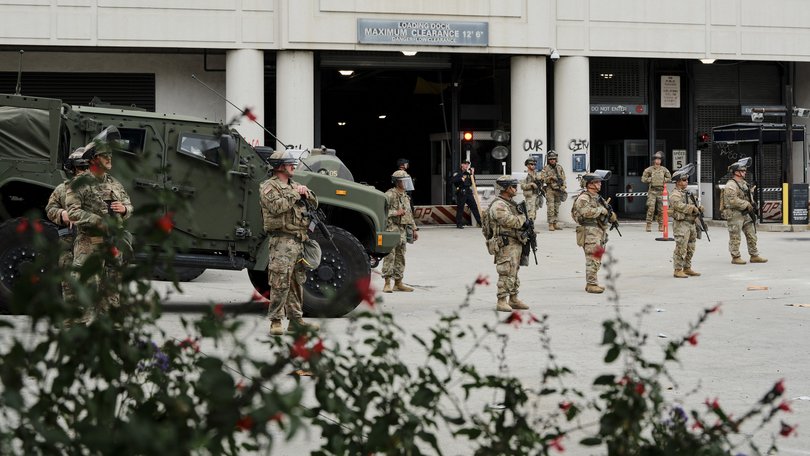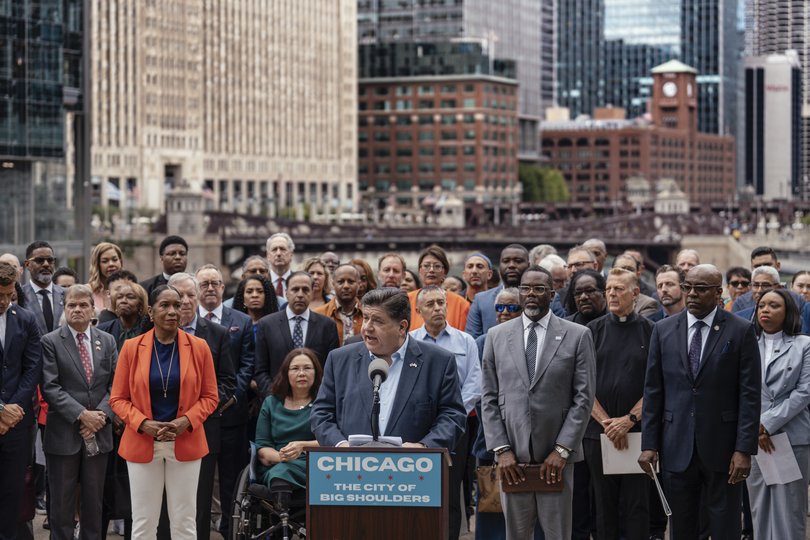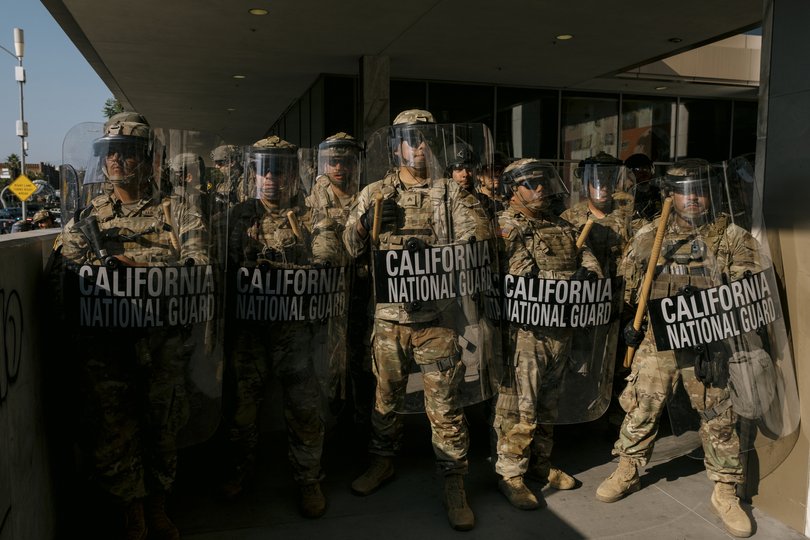THE NEW YORK TIMES: LA ruling complicates Donald Trump’s threats to send troops to more cities
THE NEW YORK TIMES: A ruling that Trump has been using troops illegally to perform law enforcement functions in LA will impede any plans he may have for sending the military into other cities.

A federal judge’s ruling that President Donald Trump has been using troops illegally to perform law enforcement functions in Los Angeles will — if it stands — pose impediments to any plans Trump may have for sending the military into the streets of other cities, including Chicago.
Trump has made those threats in the context of his anti-crime operation in Washington DC, which has involved both civilian federal agents and National Guard troops under federal control. But because the District of Columbia is not a state, the federal government has greater latitude to use the Guard there.
The Posse Comitatus Act, enacted in 1878, makes it illegal to use federal troops for domestic policing under normal circumstances. So to keep from running afoul of that law, Trump would need a legal rationale for deploying troops to cities incuding Chicago.
Sign up to The Nightly's newsletters.
Get the first look at the digital newspaper, curated daily stories and breaking headlines delivered to your inbox.
By continuing you agree to our Terms and Privacy Policy.One potential model for Trump might be the reasoning his administration offered for sending troops to Los Angeles over the summer, ostensibly to protect federal agents and facilities. But on Tuesday, Judge Charles Breyer of the U.S. District Court in San Francisco held that the administration has been using those troops too expansively.
The judge barred the federal government from using troops anywhere in California to engage in “arrests, apprehensions, searches, seizures, security patrols, traffic control, crowd control, riot control, evidence collection, interrogation, or acting as informants.”
Speaking to reporters later on Tuesday, Trump called Breyer a “radical left judge.” The judge’s order is scheduled to take effect Sept. 12, giving the Trump administration time to appeal.
There are reasons for caution at this stage. An appeals court has overturned an earlier decision by Breyer, in which he tried to strike down Trump’s assertion of federal control of California National Guard troops over the objections of the state’s governor, Gavin Newsom.

But if other courts adopt Breyer’s reasoning, it would limit Trump’s ability to use the operation in Los Angeles as a precedent to justify deploying federal troops into other cities to fight crime.
Democratic governors far from California said Tuesday that the judge’s ruling was a victory for them as well.
“This ruling confirms what the American people already knew — this deployment was never about public safety,” said Gov. Maura Healey of Massachusetts, who has spoken out against Trump’s domestic use of the military. “It was yet another political stunt from President Trump intended to intimidate and punish anyone who disagrees with him.”
On Tuesday afternoon, speaking from the Oval Office, Trump also denounced a spate of Labor Day weekend shootings in Chicago and brought up crime in Baltimore as well, calling each city a “hellhole” and saying he wanted to use his Washington operation as a template.
But he also reiterated his desire to be invited in, something he said last week.
“I would love to receive calls from governors and mayors saying they need help. We’ll help them. We have a lot of people. We have a great force. We have a great military force.”
Gov. JB Pritzker of Illinois, a Democrat, responded defiantly Tuesday afternoon.
“When did we become a country where it’s OK for the U.S. president to insist on national television that a state should call him to beg for anything, especially something we don’t want?” he asked reporters in Chicago. “Have we truly lost all sense of sanity in this nation that we treat this as normal?”
During the Black Lives Matter protests of 2020, during his first term, Trump wanted to invoke the Insurrection Act, an 1807 law that creates an exception to the Posse Comitatus Act and gives presidents the emergency power to use federal troops on domestic soil to restore law and order. But his aides talked him out of invoking the 1807 law.

Trump declared during the 2024 presidential campaign that if he returned to power, he would send troops into the streets of Democratic-run cities without waiting to be asked. So far he has done it twice, in Los Angeles and in Washington, but on both occasions he has relied on narrower legal authority, without invoking the Insurrection Act.
In his ruling Tuesday, Breyer suggested that there may be a reason: If presidents invoke that law to unilaterally send troops into the streets, without any request for assistance from a state governor, courts could review whether federal intervention was necessary.
The Trump administration’s demurral from invoking the Insurrection Act in the Los Angeles matter, the judge wrote, “is, perhaps, a tacit admission that President Trump would be unable to make the showing, required under the Insurrection Act, to rebut the presumption that state and local officials in Los Angeles were unable or unwilling to act.”
The last time the Insurrection Act was used was in 1992, when President George H.W. Bush sent federal troops to Los Angeles to help quash rioting that broke out following a jury’s acquittal of white police officers who had been videotaped beating a Black motorist, Rodney King. In that case, however, both the mayor and the governor requested the federal assistance.
Presidents have not invoked the act to use troops unilaterally without the consent of state governors since the era of the Civil Rights Movement.
After sending troops and federal agents into the streets of Washington last month to crack down on crime, however, Trump suggested he wanted to do the same in Chicago and New York, and was willing to use active-duty troops on city streets.
In response, Pritzker accused Trump of “searching for ways to lay the groundwork to circumvent our democracy, militarize our cities and end elections.”
Trump’s continued threats have raised the question of whether he could claim that crime in Chicago threatens federal functions there, as he did in Los Angeles, as a basis for sending in troops without risking a legal fight over invoking the Insurrection Act without a request for assistance.
In June, after protests erupted in Los Angeles, and sometimes became violent, over the Trump administration’s immigration crackdown, Trump federalized part of the California National Guard and dispatched Guard troops and active-duty Marines. The stated purpose was to protect federal buildings, officials and functions.
But Breyer found in his ruling that once the troops were deployed, the administration used them far too expansively — including by sending them out to accompany immigration and drug enforcement agents on operations across the region, to set up protective perimeters, blockade traffic and perform crowd control, where there was no anticipated threat to the safety of federal agents.
Originally published on The New York Times
